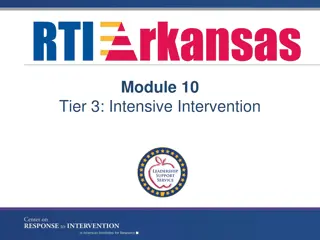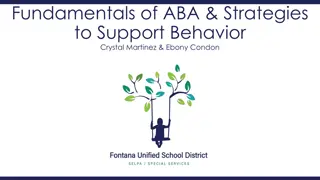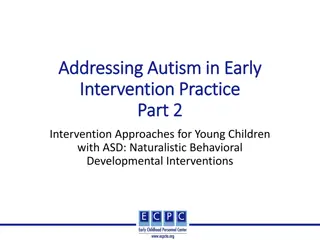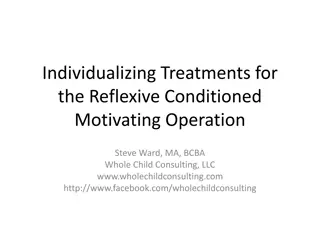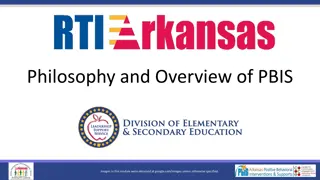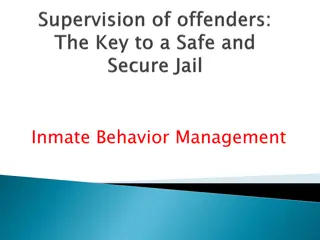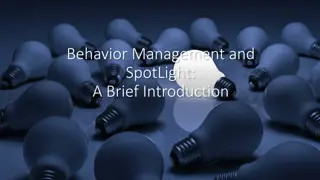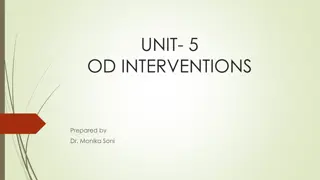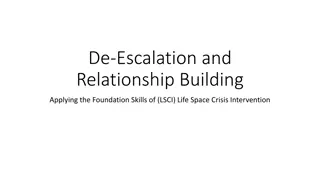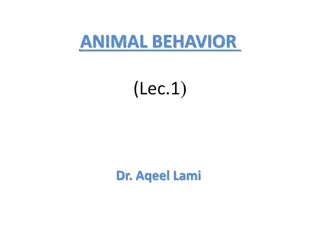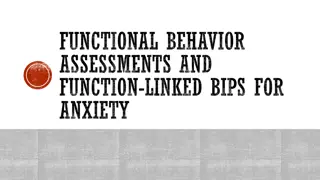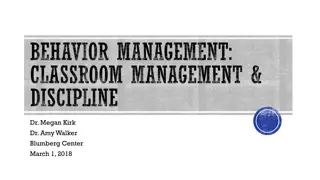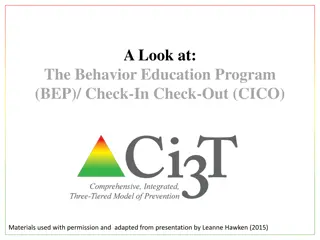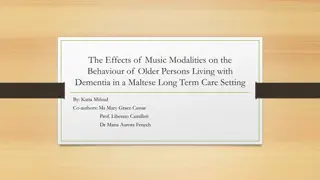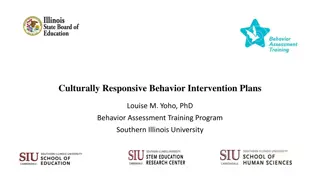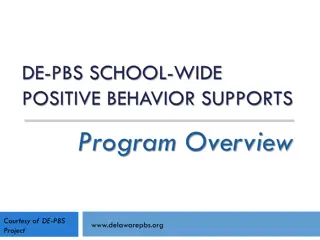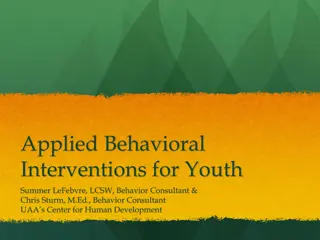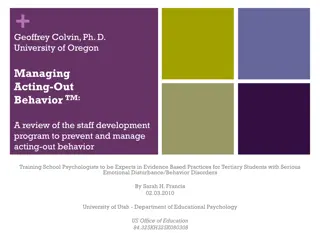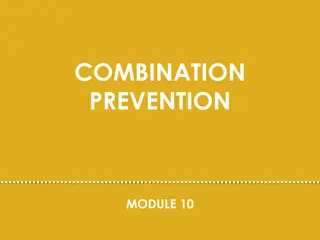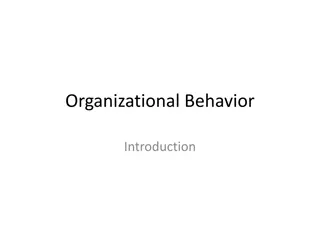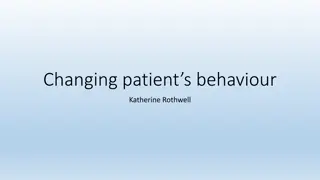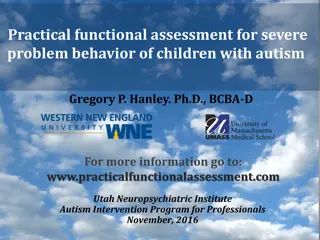Positive Behavior Support Interventions in Education
Learn about Tier 1 Positive Behavior Interventions & Supports (PBIS) developed by California State University and LA Unified School District. Explore evidence-based strategies like effective transitions, praise, choice-making, and establishing routines to promote positive behavior in students. Disco
1 views • 10 slides
Function Based Thinking
Function-based thinking in Missouri Schoolwide Positive Behavior Support, emphasizing data-based decision-making, mission clarity, and effective teaching practices. Understand how behavior is related to the environment and how environmental interventions play a key role in shaping expected behaviors
6 views • 27 slides
Addressing Predatory Behavior in the Fellowship
Predatory behavior, especially towards vulnerable members, is a concerning issue in the fellowship. This behavior includes unwelcome advances, exploitation of power dynamics, and institutional sexism. The discussion on predatory behavior necessitates honest dialogue and a united approach for a safer
3 views • 13 slides
Understanding the Role of Board-Certified Behavior Analysts in Supporting Students with Autism in PA School Programs
Pennsylvania Training and Technical Assistance Network (PaTTAN) plays a crucial role in supporting students with autism through the efforts of Board-Certified Behavior Analysts. The increasing number of students eligible for IEPs under the definition of autism necessitates skilled educators who can
0 views • 20 slides
Clinical Excellence in Nursing: SCENS Simulations for Disruptive Behavior Management
SCENS provides simulations focusing on Prevention and Management of Disruptive Behavior (PMDB) in nursing services, emphasizing safety protocols and effective communication. The training covers early signs of escalating behavior, stress levels recognition, and interventions to handle disruptive situ
0 views • 19 slides
Understanding Tier 3 Intensive Intervention in RTI Systems
This content delves into the critical features of Tier 3 interventions within Response to Intervention (RTI) frameworks. It covers the objectives of Tier 3 systems, designing and implementing interventions, problem-solving processes, essential components of RTI, evidence standards for interventions,
0 views • 64 slides
Understanding Fundamentals of ABA & Behavior Support Strategies
ABA utilizes evidence-based interventions to enhance skill acquisition and reduce challenging behaviors, focusing on socially significant areas of development. The content covers key concepts such as defining ABA, ABCs of behavior, functions of behavior, and effective strategies to support behavior.
0 views • 29 slides
Understanding Naturalistic Developmental Behavioral Interventions for Children with ASD
This resource explores the history of autism interventions, focusing on Naturalistic Developmental Behavioral Interventions for young children with ASD. It covers theoretical approaches, specific needs met by NDBIs, examples of research-validated NDBI models, and common elements used in intervention
0 views • 53 slides
Understanding Consumer Behavior in Marketing
The design of a marketing program starts with understanding consumer behavior. Consumers, as the end users, play a crucial role in shaping market trends. Producers seek insights into consumer personas, market behaviors, and influencing factors. Management focuses on the consequences of consumer beha
2 views • 26 slides
Understanding Psychology: The Science of Behavior and Mental Processes
Psychology is the scientific study of behavior and mental processes. Psychologists study both observable behavior and private mental processes. The primary goals of psychology are to describe, understand, predict, and control behavior. Different branches of psychology, such as applied psychology, cl
2 views • 29 slides
Individualizing Treatments for Reflexive Conditioned Motivating Operation
Understanding the importance of individualizing treatments for escape/avoidance behaviors in individuals with ASD. Factors such as behavior change speed, alternative repertoires, and aversive stimuli considerations are crucial for effective intervention. Generic interventions may not address behavio
0 views • 47 slides
Transforming School Culture Through Positive Behavior Interventions and Supports
Explore the philosophy, challenges, and solutions in implementing Positive Behavior Interventions and Supports (PBIS) in schools. Discover the importance of changing school culture, addressing student behaviors effectively, and creating a supportive learning environment. Learn how PBIS can enhance s
0 views • 39 slides
Understanding Inmate Behavior Management in Correctional Settings
Inmate Behavior Management in correctional facilities involves supervising inmates, implementing corrective discipline, and fostering a fair and consistent environment. It emphasizes the importance of behavior management plans, identifying undesirable traits in supervision, and passing educational a
0 views • 19 slides
Understanding Behavior Management and SpotLight System in Schools
This overview introduces Behavior Management and SpotLight in educational settings, emphasizing the importance of a positive behavior intervention system like SpotLight for effective school-wide management. It discusses the features, benefits, users, and methods of utilizing SpotLight to address var
0 views • 13 slides
Understanding Organizational Development Interventions
Organizational Development (OD) Interventions play a crucial role in enhancing organizational functioning and aiding managers in navigating team dynamics. These interventions encompass various techniques, including behavioral and non-behavioral approaches such as Sensitivity Training, Transactional
4 views • 17 slides
Understanding Human Behavior: Foundations and Factors
Human behavior is a multifaceted subject influenced by genetic makeup, culture, and individual values. It encompasses both overt actions and covert thoughts, a product of the individual and environmental factors. Psychologists study behavior from visible (overt) actions like playing football to inne
0 views • 20 slides
Effective Strategies for De-Escalation and Relationship Building in Crisis Intervention
Learn how the quality of relationships impacts the success of interventions, the importance of addressing feelings before behavior, and key skills like validating and affirming in managing emotionally charged events. Discover the power of language in supporting positive behavior and effective behavi
0 views • 12 slides
Understanding Normal and Abnormal Behavior: Perspectives and Definitions
Normal behavior varies from person to person and society, influenced by individual preferences and societal norms. Abnormal behavior is characterized by an inability to function effectively or personal discomfort. The concept of normality and abnormality in psychology raises complex questions about
2 views • 8 slides
Understanding Human Behavior: Insights for Social Workers
This material delves into the intricacies of human behavior, exploring factors influencing behavior such as heredity, environment, intelligence, needs, and motives. It covers the concept of human behavior, stages in life from conception to old age, and theories of human development by eminent psycho
2 views • 71 slides
Understanding Animal Behavior and Ecology
Animal behavior encompasses a range of activities such as feeding, breeding, and social interactions. Ethology focuses on studying behavior in natural environments, while behavioral ecology examines ecological aspects like predator-prey interactions. Sociobiology delves into the evolution of social
3 views • 5 slides
Understanding Setting Events in Behavioral Assessments for Anxiety
Functional Behavior Assessments (FBAs) and Behavior Intervention Plans (BIPs) play a crucial role in addressing anxiety issues in students. By identifying setting events and antecedents, teachers can develop prevention strategies, teach replacement behaviors, and provide reinforcement tailored to ma
0 views • 18 slides
Coping Behavior Variances in Adolescents with Varying Degrees of Internet Addiction
Adolescence is a critical period for personal development where coping behavior plays a significant role. This study by Irina Petrochenko focuses on exploring coping behavior features in adolescents with different levels of internet addiction. Research methods involved testing 75 individuals aged 14
0 views • 10 slides
Understanding Behavior Management in Classroom Settings
Explore the essential topics of behavior management, classroom strategies, and discipline in educational settings. Delve into the functions of behavior, impact of trauma on learning, and effective management techniques. Learn how to identify underlying reasons for student behaviors, discuss behavior
0 views • 76 slides
Targeting Emotions to Facilitate Behavior Change in Older Adults
Efforts in changing health behavior have traditionally focused on social and cognitive factors, but recent evidence highlights the importance of affective states in decision-making and behavior change. Janey Peterson discusses the role of emotions in achieving and sustaining behavior change to benef
0 views • 11 slides
Behavior Education Program (BEP) / Check-In Check-Out (CICO) Overview
The Behavior Education Program (BEP) and Check-In Check-Out (CICO) are structured interventions aimed at improving behavior in students through goal-setting, feedback, and reinforcement. This program involves daily check-ins and check-outs with staff members, regular feedback from teachers, and the
0 views • 49 slides
Grading Criteria for Effort and Behavior in Educational Reporting
Effort and behavior in educational settings are evaluated based on criteria ranging from Excellent to Causing Concern. Pupils demonstrating excellent behavior show respect, responsibility, and positive engagement in learning. Those with good behavior exhibit cooperation and respect for others, albei
0 views • 9 slides
Exploring Music Modalities for Dementia Care in Maltese Long-Term Settings
This study investigates the impact of music modalities on the behavior of older individuals living with dementia in a Maltese long-term care facility. Through music sessions and behavior assessments, the research aims to discover new ways to incorporate alternative therapies into dementia care, offe
0 views • 15 slides
Enhancing Interventions for Sex Offenders: The Dynamic Risk Guide
Explore the principles of effective interventions, current strategies for addressing sex offender needs, and incorporating dynamic risk factors to provide targeted interventions. Uncover insights from a survey highlighting areas for improvement and learn about the Dynamic Risk Guide tool aiding agen
0 views • 25 slides
Culturally Responsive Behavior Intervention Plans Webinar Series
This webinar series explores the significance of culturally responsive evidence-based behavior intervention plans for students, especially those from historically marginalized groups. It addresses the impact of exclusionary discipline practices, provides insights on functional behavior assessment (F
0 views • 28 slides
Effective Interventions for Students with Academic Difficulties
University of Utah's evidence-based practices focus on training school psychologists to support tertiary students with serious emotional disturbance or behavior disorders. The "Interventions in a Flash" strategy helps struggling students acquire and retain basic skills like math facts and sight word
0 views • 23 slides
Positive Behavior Support Program Overview
School-Wide Positive Behavior Support is a systems approach that aims to establish a positive social culture and individualized behavioral support in schools to enhance both social and academic success for all students. It focuses on preventing problem behaviors through teaching positive social expe
0 views • 27 slides
Understanding Applied Behavior Analysis (ABA) for Youth Interventions
Applied Behavior Analysis (ABA) is a science focusing on improving human behavior by increasing desired behaviors, teaching new skills, and generalizing behaviors. ABA emphasizes observable behaviors, measurement of behavior change, and the use of interventions in various settings like classrooms an
0 views • 25 slides
PBIS Expectations and Behavior Flowchart
The PBIS flowchart outlines behavior expectations and interventions for minor and major incidents in a school setting. It covers disrespectful behavior, disruption, defiance, property damage, theft, possession of weapons, and more. The flowchart guides teachers and staff on managing and addressing s
0 views • 6 slides
Managing Acting-Out Behavior: A Staff Development Program Review
This review discusses a staff development program created by Geoffrey Colvin, Ph.D., from the University of Oregon, focusing on preventing and managing acting-out behavior in students with emotional disturbance or behavior disorders. The program includes video presentations, strategies for behavior
0 views • 22 slides
Combination HIV Prevention Strategies and Interventions
Explore the comprehensive approach to HIV prevention through a combination of biomedical, behavioral, and structural interventions. Learn about the goals of prevention, the ecological model, and the various strategies such as biomedical interventions and behavioral interventions. Discover how these
0 views • 16 slides
Understanding Organizational Behavior and Individual Behavior
Organizational Behavior (OB) is a multidisciplinary field that combines knowledge from various disciplines to study and manage organizations effectively. It emphasizes the application of this knowledge to enhance organizational effectiveness and the well-being of participants. OB is a useful concept
0 views • 38 slides
Function-Based Behavior Support Plans: A Comprehensive Guide
Explore the process of developing Function-Based Behavior Support Plans (BSP) using Functional Behavioral Assessment (FBA). Understand the concepts of function and functional behavior assessment, learn how FBA/BSP fits within a multi-tiered support system, and practice developing BSP for students. D
0 views • 74 slides
Stages of Behavior Change in Patients by Katherine Rothwell
The stages people go through when changing behavior, as outlined by Katherine Rothwell, include contemplation, decision-making, active change, relapse, maintenance, and optimal recovery. Interventions are tailored to each stage to increase the likelihood of successful change, with a focus on underst
0 views • 25 slides
Behavior Change and Health Modules Overview
Explore behavior modification theories, change management concepts, and competency modules to design effective behavior modification strategies for occupational health interventions in communities. Learn the difference between professional-directed and patient-centered behavior change approaches thr
0 views • 41 slides
Functional Assessment for Severe Problem Behavior in Children with Autism
This practical and informative material discusses functional assessments for severe problem behavior in children with autism, presenting case examples and hypotheses for behavior analysis. The process involves identifying triggers and functions of the behavior to create effective interventions. The
0 views • 48 slides





